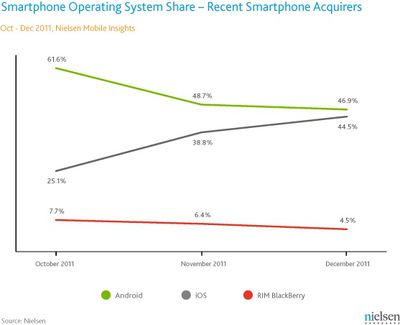Last week, research firm NPD released data showing that Apple's iOS had significantly closed the gap on Android in new U.S. smartphone sales in October and November, narrowing Android's 34 percentage-point lead to just four points in the wake of the iPhone 4S debut.

Nielsen now takes a look at its own data, showing similar momentum that had carried over through the end of 2011.
Among recent acquirers, meaning those who said they got a new device within the past three months, 44.5 percent of those surveyed in December said they chose an iPhone, compared to just 25.1 percent in October. Furthermore, 57 percent of new iPhone owners surveyed in December said they got an iPhone 4S.
Breaking the data down into monthly surveys of people who had acquired a new smartphone over the previous three months, that iPhone 4S effect resulted in iOS nearly matching Android in share of recent smartphone acquirers as of December.
Given the three-month windows of time covered by each monthly survey, December's data would include at least several weeks of time prior to the iPhone 4S launch. Data for January could thus show even stronger performance by Apple, although some of the early iPhone 4S adopters may fall out of the January sample due to the three-month window having closed, depending on when during the month the data is collected.






















Top Rated Comments
For somebody who spends 2+ hours a day driving to/from work and communicates mainly via text message, Siri is -not- a gimmick.
This is just one example, but your opinion is not fact. There are many people (myself included) for whom Siri is the killer feature that made them buy the product. I was prepared to hunker down and get another year out of my 3GS until I saw this feature.
No surprise, though. Apple's nailed a strategy that lasts over the long term.
US = a massive market, and arguably one of the most coveted. The US market can do wonders for your brand power.
It speaks to the strength of Apple products when with just a couple of models they can capture significant share (all under one roof, never mind tons of OEMs.)
Now, given that, imagine what it means for a product like that to capture majority or near-majority share, in the wake of a market flooded by OEMs running a universally-licensed OS.
People will always text and drive, as long as there are cell phones at least. I'd rather have someone watching the road and texting while driving rather than someone staring at their crotch, texting, and driving.
On the other side of things, for those who nay-say against Siri, she certainly rocks when it comes to Speech to Text; seriously, I haven't typed a single message in a long time without using STT.
I signed in just to say... Well said!